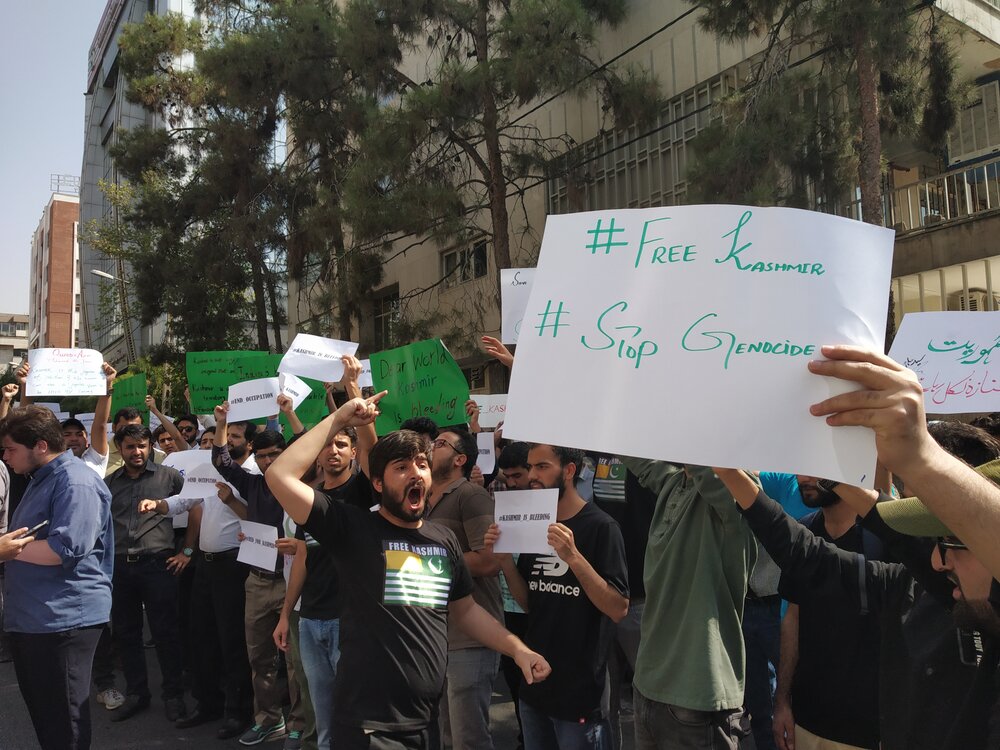‘Free Kashmir’ slogans reverberate in Tehran

TEHRAN - In solidarity with the people of Indian-controlled Kashmir, hundreds of people, mostly university students, staged a demonstration in front of the Indian Embassy in Tehran on Thursday morning.
Organised by student groups at Tehran University and Elm o Sanat University, the protest saw participation of people from different walks of life, who expressed grave concern over recent developments in Indian-controlled Kashmir.
Raising pro-Kashmir slogans, the protestors denounced latest move of the Indian government to revoke special provisions given to J&K and change its disputed character.
Wearing black shirts and holding placards with evocative messages, the protestors stood in front of the Indian embassy in central Tehran and denounced India’s Kashmir policy and what they termed ‘atrocities committed against the people of Kashmir’.
Slogans like ‘Until death no humiliation’, ‘Kashmir is a disputed territory’, ‘Kashmir belongs to Kashmiris’, and ‘We want freedom’ reverberated in the humid morning air.
There were emotional scenes also as students spoke about not being able to contact their families and concerns about safety and well-being of their loved ones.
“I have not spoken to my family in four days, there is complete communication blackout and the whole valley has been turned into a cage for its inhabitants,” said Abid Hussain, a Kashmiri student who came from Qom province to take part in the protest.
“What India is trying to do in Kashmir is not only against the country’s own constitution but also against international legal and humanitarian norms. The world needs to stand up and speak in once voice for oppressed Kashmiris,” said Mazhar Hussain, a university student in Tehran.
Speaking at the demonstration, one of the organisers said it is the duty of every person with conscience to speak truth to power because ‘today it is them, tomorrow it could be us’.
On Monday, Indian government abrogated Article 370 and 35A, thus ending special status given to J&K state under the Indian constitution. The government also moved a bill to bifurcate the state into two union territories (UN).
The move came for widespread criticism in and outside India, with observers lambasting the Narendra Modi led government in New Delhi for the ‘unconstitutional move’ and ‘murder of democracy’.
According to observers, the move hailed as Modi’s ‘political masterstroke’, has brought back focus on the longstanding Kashmir imbroglio with people terming Kashmir as ‘South Asia’s Palestine’.
Anticipating public backlash, the Indian government had in advance announced stringent restrictions in the state, banning movement and assembly of people and ordering communication blockade.
However, despite restrictions, people have managed to come out and protest. According to unconfirmed reports, there have been some casualties in central and south Kashmir in police action.
Observers believe yet another season of unrest has set in and it will be difficult for the Indian government to contain the situation this time.
“It is an unprecedented situation in terms of panic, fear and anger among people and they will not take it lying down. Even pro-India politicians have been detained, which was quite shocking” said Hilal Ahmad, a Kashmir-based commentator. “Peace in Kashmir has received a heavy blow.”
Meanwhile, many regional countries have issued statements, expressing umbrage over the move. China has conveyed its ‘objections’ in no inexplicit terms while Iran has said it is closely watching the developments unfolding in the Indian-controlled Kashmir.
On the other hand, Pakistan has decided to downgrade its ties with India and suspend trade in reaction to India’s controversial moves in Kashmir, according to reports.
The United Nations has also expressed its ‘concern’ over restrictions imposed on people in the disputed territory and warned that it “will exacerbate the human rights situation”.
